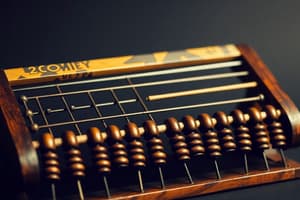Podcast
Questions and Answers
What was the original meaning of the term 'computer' as recorded in 1613?
What was the original meaning of the term 'computer' as recorded in 1613?
- A computer program for computations
- A mechanical device for calculations
- An early form of a calculator
- A human who performs calculations (correct)
Which of the following devices was invented first and is known for assisting with basic arithmetic operations?
Which of the following devices was invented first and is known for assisting with basic arithmetic operations?
- Abacus (correct)
- Tally Stick
- Napier’s Bones
- Slide Rule
What is a primary limitation of the Pascaline, invented by Blaise Pascal?
What is a primary limitation of the Pascaline, invented by Blaise Pascal?
- It was too expensive
- It was too difficult to operate
- It could not perform multiplication (correct)
- It was only used in laboratories
Which invention is recognized as the first mass-produced calculating machine?
Which invention is recognized as the first mass-produced calculating machine?
Napier’s Bones made it possible for operators to perform which of the following calculations?
Napier’s Bones made it possible for operators to perform which of the following calculations?
What is the main purpose of a Jacquard Loom?
What is the main purpose of a Jacquard Loom?
Which device was not primarily designed for performing basic arithmetic operations?
Which device was not primarily designed for performing basic arithmetic operations?
Which of the following describes the Difference Engine?
Which of the following describes the Difference Engine?
Which device is known as the first programmable computer?
Which device is known as the first programmable computer?
Who is credited with inventing the first printing calculator?
Who is credited with inventing the first printing calculator?
Which of the following computers was the first electronic general-purpose computer?
Which of the following computers was the first electronic general-purpose computer?
What is the significance of the device known as EDVAC?
What is the significance of the device known as EDVAC?
Which invention is attributed to John Atanasoff and Clifford Berry?
Which invention is attributed to John Atanasoff and Clifford Berry?
Who was the first lady programmer?
Who was the first lady programmer?
Which machine was developed by Herman Hollerith for the 1890 U.S. Census?
Which machine was developed by Herman Hollerith for the 1890 U.S. Census?
What was the first portable computer released in 1981?
What was the first portable computer released in 1981?
Flashcards are hidden until you start studying
Study Notes
Earliest Computers
- The term "computer" was first recorded in 1613, referring to a person performing calculations.
- Initially, calculations were done by humans, requiring extensive training in mathematics.
Tally Sticks
- Ancient device used as a memory aid to record numbers, quantities, or messages.
Abacus
- Mechanical device invented in Babylonia around 2400 B.C. and popularized in China around 500 B.C.
- Utilized for basic arithmetic operations, aiding mathematical calculations.
Napier’s Bones
- Invented by John Napier in 1614.
- Allowed multiplication, division, and square root calculations through movable rods on a board.
Slide Rule
- Developed by William Oughtred in 1622, based on logarithmic principles.
- Primarily used for multiplication, division, roots, logarithms, and trigonometry; not for addition or subtraction.
Pascaline
- Invented by Blaise Pascal in 1642, focused on addition and subtraction.
- Ultimately was not commercially successful due to high costs and limitations.
Jacquard Loom
- Mechanical loom created by Joseph and Marie Jacquard in 1881.
- An automatic loom controlled by punched cards.
Arithmometer
- Invented by Thomas de Colmar in 1820, recognized as the first reliable commercial calculating machine.
- Capable of performing four basic mathematical functions and was mass-produced.
Difference Engine and Analytical Engine
- Designed by Charles Babbage, with the Difference Engine invented in 1822 and the Analytical Engine in 1834.
- Considered the first mechanical computer, designed to tabulate polynomial functions.
Scheutzian Calculation Engine
- Developed by Per Georg Scheutz in 1843, based on Babbage’s Difference Engine.
- Recognized as the first printing calculator.
Tabulating Machine
- Invented by Herman Hollerith in 1890 for summarizing information and accounting.
- Specifically designed to handle data processing for the 1890 U.S. Census.
Harvard Mark 1
- Also known as the IBM Automatic Sequence Controlled Calculator (ASCC), developed by Howard H. Aiken in 1942.
- Recognized as the first electro-mechanical computer.
Z1
- First programmable computer created by Konrad Zuse in Germany between 1936 and 1938.
- Employed punched tape for programming and generating output.
Atanasoff-Berry Computer (ABC)
- First electronic digital computing device, developed by Professor John Atanasoff and Clifford Berry at Iowa State University between 1939 and 1942.
ENIAC
- Stands for Electronic Numerical Integrator and Computer, completed in 1946.
- Recognized as the first electronic general-purpose computer, developed by John Presper Eckert and John Mauchly.
UNIVAC 1
- The first commercial computer, designed by John Presper Eckert and John Mauchly.
First Computer Company
- Electronic Controls Company is recognized as the first computer company, founded by Eckert and Mauchly in 1949.
EDVAC
- Stands for Electronic Discrete Variable Automatic Computer, designed in 1952 by John von Neumann.
- First stored program computer, capable of storing both programs and data.
First Portable Computer
- Osborne 1 is credited as the first portable computer, released in 1981 by Osborne Computer Corporation.
Ada Lovelace
- Acknowledged as the first female programmer in history.
Studying That Suits You
Use AI to generate personalized quizzes and flashcards to suit your learning preferences.




